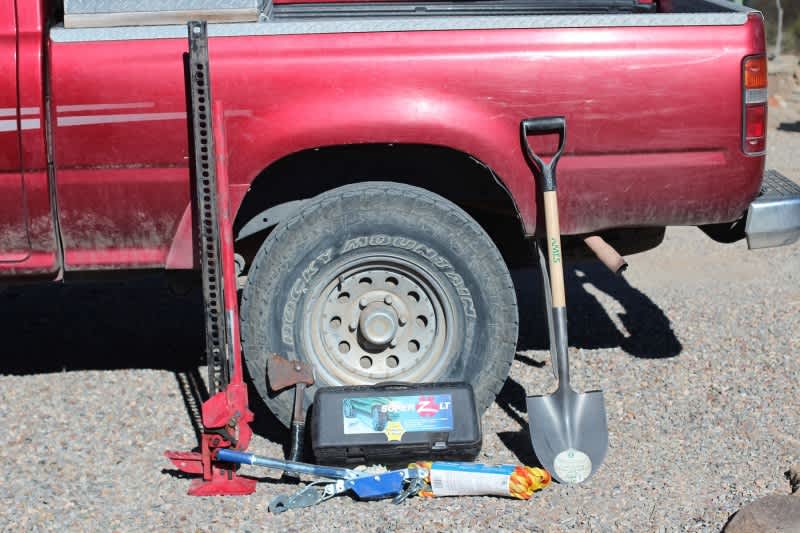Better Safe Than Sorry: Getting Unstuck Off the Main Road
James Swan 09.27.13

Last fall I gave turkey hunting a shot in northern New Mexico. I’d scouted some birds earlier during the dusky grouse season, and as I turned off the main road, tracks in inch-deep snow were all over the place.
I slowly crept along the dirt road in my truck. There were patches of snow on the ground, but other places were bare ground. Four-wheel drive and oversized tires made me feel that I could handle single inch of snow with no trouble. I soon came to an area that was shaded by trees bordered by two silver dollar-size reflectors, one on both sides of the road. Then, all of the sudden, my wheels spun. There was black ice under the snow. The reflectors meant that a spring ran under the road here.
I got out and shifted into four-wheel. No go. Wheels that were oversized with good treads just spun. Before I knew it, I had slipped off the road into the soft caliche clay that’s found in many parts of New Mexico.

I got out and surveyed the situation. It didn’t look that bad, but I couldn’t get any traction. I cut some branches from nearby pine trees and slipped them under the wheels. No change.
I’ve been fishing and hunting all across North America since the 1960s and I’ve never not been able to get out of something like this, but the combination of black ice and caliche clay had me stymied. Frankly, it was embarrassing—my wheels were not sunk in that deep. It looked like I should be able to get out.
I got out the cell phone, but no luck. The absence of fresh tracks on the road, except for turkey tracks, made me begin to worry. The nearest town was 15 miles away. I hiked to a slightly higher elevation and again tried the cell. This time I got through to my home that was 125 miles away. I gave them my location and they said if things did not change, they would call the insurance company for a tow truck and/or come and get me.
Okay, now I had some back-up. But it was already mid-afternoon, and the temperature was starting to drop. I had a blanket in the car, a space blanket in my backpack along with a mirror and a whistle, plus some matches, energy bars, and water, so there was no immediate danger, but I did not look forward to spending the night in that remote area. It can snow at any time at such elevations.
More branches and some sand tossed in from bare ground 50 yards away had no effect. Almost four hours had passed since I got stuck. I was about to return to my cell phone spot when around the corner came a mountain lion hunter with chains on all four wheels.
The mountain lion hunter had a winch on his truck and in less than two minutes I was out. Then he sat me down and read me the riot act on being prepared in the mountains. It was a bit embarrassing, as I was supposed to be an expert on such things, but I took down notes.

In the wild West, snow may fall 12 months of the year and soils are highly alkaline. Clay, especially caliche, turns into lard when it’s wet. So, he gave me his “better to be safe than sorry list,” which includes the following:
- Cell phone. Always carry one, but realize that it may not always work in the woods.
- Hi-Lift Jack. These tall, extremely durable jacks weigh about 30 pounds and can lift up to 7,000 pounds a couple feet in the air to get your vehicle out of the deepest hole, and they can be used like a winch. They start at $82 on Amazon.com and can be purchased through many hardware stores and at most off-road vehicle stores.
- Much cheaper than a winch is a Come-Along, which is a hand-operated ratchet lever winch that runs $37.97 at Home Depot.
- Tire chains/cables (get some for all four wheels if you have four-wheel drive).
- Tow rope.
- Shovel.
- Axe.
- First aid kit, space blanket or wool blanket, thermos, signal mirror, fire starter, and a box of energy bars.
The sun was setting as I hiked up to call back home and report that I was out. They said they had made some calls on my behalf. On the way out, I was met by a Forest Service truck and a State Police truck with a snowmobile, both coming to get me. As I got out to thank them for coming to my aid, a flock of turkeys ran across the road right behind me. I was tempted, but the mountain lion hunter had parked and was stalking them. He deserved them. I hope he got one.
Since then I’ve done some researching on stranded motorist conditions. In addition to the list, before you go out off the main road, check with local resources agencies about who can and will respond to stranded motorist calls. Game wardens will always respond, but there are not that many of them. Some federal agencies will respond, but others will not. County sheriff deputies and state highway patrol also may respond. A 911 call will respond to immediate emergencies, but things like stranded motorists may not get an immediate response.
The mountain lion hunter’s advice goes for hunters, wood cutters, families cutting Christmas trees, and sight-seers. Be safe rather than sorry, and have a great fall in the woods.

